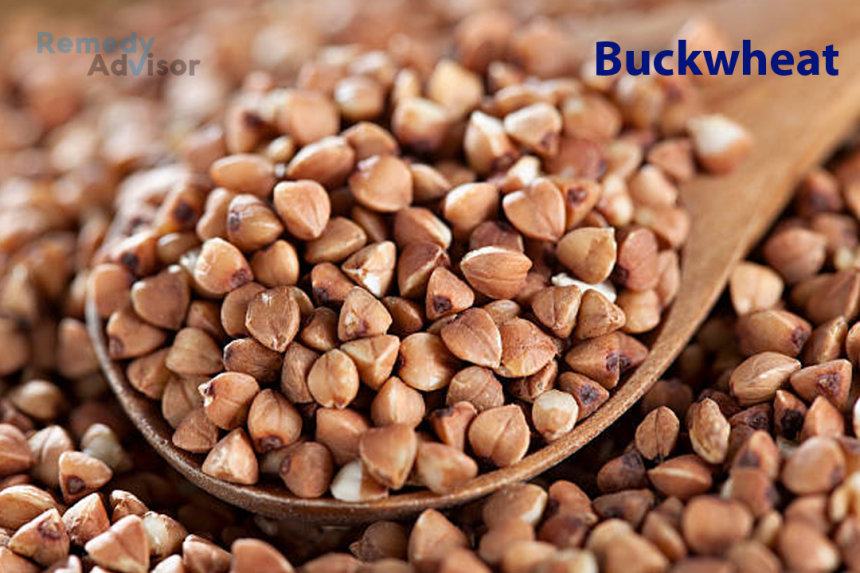Native of Northern Europe and Asia, buckwheat was extensively grown in China since the 10th till the 13th century. Throughout the 14th and 15th centuries, it was also planted in Russia and Europe. The Dutch transported buckwheat toward the United States during 17th century.
Buckwheat is supposed to be the best source of manganese and a good source of dietary fiber. However most of the fiber is insoluble, that assists gastrointestinal tract, buckwheat also consists of soluble fiber that reduces cholesterol levels and decelerates digestion, making one feel occupied for extended periods of time. Furthermore, buckwheat consists of selenium, copper, protein, amino acids, zinc, as well as Quercetin and flavonols rutin.
It is exciting to note that buckwheat is not actually a wheat or cereal grain. However it seems like and is prepared as a grain, buckwheat is actually a fruit of a broadleaved plant that is linked to rhubarb.
By itself, buckwheat does not have gluten. Thus, it is a decent option for individuals who have a gluten sensitivity or celiac illness. Though, buckwheat is often used in pancakes, pastas and breads. And, dependent upon the other components, it may not be gluten free. As an example, buckwheat might be mixed with wheat flour to create soba noodles that are actually not gluten-free.
Buckwheat is not a preferred grain for several Americans. That may change as more individuals hear what some of the scientists have learned.
Cardiovascular health
Wisconsin scientists knew that dietary protein like soy protein is capable to reduce cholesterol levels. They were conscious that animal research had determined that buckwheat protein increases the quantity of cholesterol enclosed in fecal excretion and reduces the quantity of serum cholesterol in rodents. Thus, they decided to use a human intestinal cell model to appreciate how buckwheat protein changes the absorption of cholesterol.
In an in vitro research, the scientists discovered that buckwheat protein had a robust capability to bind with cholesterol. It considerably decreases the absorption of cholesterol by 47 %. Intestinal cholesterol which is not absorbed is concealed out of the body, therefore decreasing the quantity of circulating cholesterol within the blood. As a result, the regular ingesting of buckwheat aids to eliminate more cholesterol from the blood and reduces levels of serum cholesterol. In a research, Japanese scientists explored the effects of offering rats a cholesterol-enriched diet either tartary buckwheat protein or common buckwheat protein. Researchers found that the common buckwheat protein product and tartary buckwheat protein product decrease cholesterol levels by 32 and 25 percent, individually. The scientists concluded that if buckwheat is confirmed to be effectual in humans, it may well be suitable to the millions of individuals dealing with raised levels of cholesterol.
In a South Korean study, researchers fed 40 male rats an obesogenic diet for four weeks. Then, the rats were separated into four groups. For the next four weeks, every group was nourished a diet that contains one of the following foods: buckwheat, adlay, white rice, or waxy barley. Researchers discovered that the rats consuming the adlay-buckwheat- and waxy-barley-enhanced diets had superior development in the levels of triglycerides compared to the rats consuming the white rice-enhanced diet. Rats ingesting the buckwheat and waxy barley supplemented diets had decreased levels of total cholesterol and DDL (or bad) cholesterol and greater levels of HDL (good) cholesterol compared to the rats on the white rice-added regimen. Rats fed buckwheat and waxy barley had a greater aortic lumen (opening) than those on adlay and white rice. Scientists noted that the “consumption of BW (buckwheat) and WB (waxy barley) that contains diets considerably improved numerous cardiovascular risk aspects encouraged by obesity in experimental rats.”
Management of diabetes
In a research, Canadian scientists found proof that buckwheat might be beneficial for individuals dealing with diabetes. Researchers began with around 40 rats with chemically induced type 1 diabetes. Rats were given either a single dose of buckwheat extract or a placebo. After 90 minutes and 120 minutes, the rats’ glucose levels were calculated. While there was no glucose reduction in the rats that were given the placebo, the rats that had buckwheat seed extract experienced lowered blood glucose levels by 12 to 19 percent.
According to the scientists, buckwheat can lower glucose levels because it consists of higher amounts of a compound known as chiroinositol that makes cells more sensitive to insulin.
Cancer
National Cancer Institute study noted that in rural Xuanwei County, China, there is a great occurrence of lung cancer. This is supposed to be a straight outcome of the burning of smoky coal indoors to cook and heat the poorly aerated homes. “Thus, inhabitants could be open to carcinogenic coal releases not only through inhalation but also via ingesting of these foodstuffs.”
Research carried out with 498 people with lung cancer and 498 controls discovered that consumption of rice, mushrooms, fresh meat and green vegetables was related with an improved chance of lung cancer. Conversely, the consumption of buckwheat, peppers, corn, melons, radishes, salt-preserved meat and pickled vegetables was related to a decreased chance for lung cancer. Thus, buckwheat is amongst numerous foods which are supposed to reduce the chance for lung cancer.
Overall health
In a 2007 cross-sectional study, scientists from Shanghai, China, tested a total of 3,542 individuals from two nearby counties of Inner Mongolia, China. One group consumed buckwheat seed as a staple food; while the other group consumed corn. Researchers expected to find a connotation between rates of abnormal concentrations of blood lipids, hypertension and hyperglycemia and the consumption of these staple foods. Researchers found statistically important differences between the two groups. The group who consumed buckwheat seed had better blood pressure, sugar level and lipid compared to corn-consuming group. Researchers recommended that buckwheat might help avoid these medical problems.
Should buckwheat be included in the diet? Unless somebody has a buckwheat intolerance or allergy, that is supposed to be comparatively rare in the United States, buckwheat must be part of the diet.







